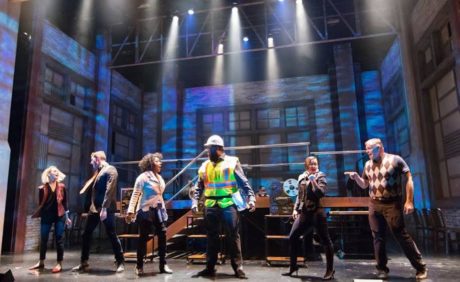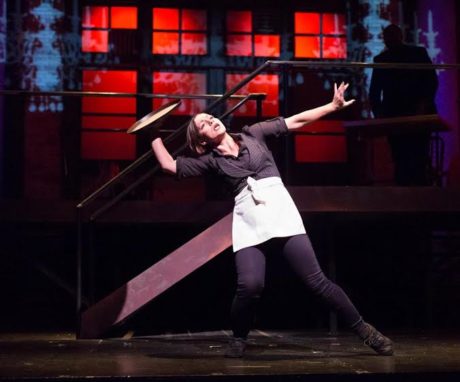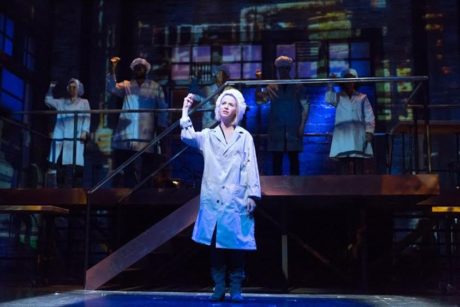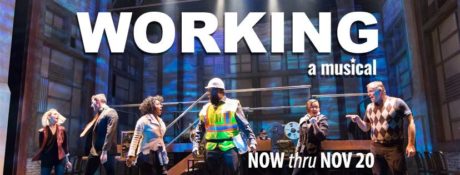Working isn’t a typical musical. There’s no plot, no resolution, no love story. Yet the tale it tells is an absorbing one. By using words and music to examine the relationship of people to their jobs, it paints a fascinating picture of a side of America too often taken for granted.

Working has its roots in Studs Terkel’s 1974 best seller Working: People Talk About What They Do All Day and How They Feel About What They Do. Terkel interviewed hundreds of people from all walks of life about their connection to work. Stephen Schwartz (composer of the musicals Godspell and Wicked) was the guiding force in bringing Terkel’s book to the stage, but he was not the show’s only composer. Instead, the show used original songs by a group of songwriters that included everyone from Mary Rodgers (Once Upon a Mattress) to pop star James Taylor.
Working had only a brief Broadway run in 1978, but a few years ago Schwartz and his associates revised the show – adding contemporary references, paring down the cast, eliminating some songs, and adding new ones by Hamilton scribe Lin-Manuel Miranda. It’s that lean, focused version of Working that has arrived at Bristol Riverside Theatre.
Each scene and each song in Working is a finely detailed character study. The book, credited to Schwartz and Nina Faso (with contributions by Gordon Greenberg), uses sparse, precise language to define dozens of characters, played by a versatile cast of six. (The actors are all strong singers, and they delineate their characters by using different accents in every scene.)
The actors address the audience and talk (and sometimes sing) about their jobs. Each character tells of how they found self-worth through their profession – or, in some cases, failed to find it. And while there may not be a plot, the script has dramatic momentum as it shows a disparate group of people struggling to prosper.
The show’s structure allows us to see the connections between the characters. For instance, in the song “The Mason” (written by Craig Carnelia), a stone mason (played by Philip Chaffin) sings happily of how his work gives him satisfaction because “it’s made to last.” Moments later, we meet a theatrical press agent (Kevin Toniazzo-Naughton) whose life is filled with anxiety because his work is so ephemeral. After decades of work, he fears he has nothing to show for his efforts.

Working depicts people from multiple social classes. Some characters are being squeezed by the economy; others, like a ruthless hedge fund manager (Tamar Greene), are doing the squeezing themselves. A prostitute (Jenny Lee Stern) shares the stage with a socialite fundraiser (Laura Giknis); needless to say, they have different perspectives on life and work.
We also meet people whose dream jobs didn’t live up to their dreams. In “Nobody Tells Me How” (by Rodgers and Susan Birkenhead), a veteran teacher (Demetria Joyce Bailey) laments how dispiriting her profession has become. Later, a cop turned firefighter (Toniazzo-Naughton) reveals the troubling reason he changed professions.
The most powerful moment comes in Taylor’s “Millwork,” delivered with hollow-eyed, heartbreaking poignancy by Giknis. As a line worker whose job is slowly killing her – and suffocating her spirit – Giknis captures the hopelessness of a woman who knows there’s no way out:
It’s me and my machine
For the rest of the morning
For the rest of the afternoon
And the rest of my life
Meanwhile, Stephen Casey’s choreography evokes the robotic actions that the millworkers must enact eight hours a day.
But Working isn’t all doom and gloom. In Schwartz’s “It’s an Art,” a waitress (Stern, in an exuberant, dizzying performance) tells of how fulfilling she finds her work (“Don’t you think you deserve to be served by me?”). It’s a delight seeing Stern leap across the stage, putting on a show for her customers – and for the audience.
Not every song in Working is successful. “Delivery,” Miranda’s number about a fast food worker, rushes by too quickly to make an impact. Micki Grant’s “If I Could’ve Been,” a bleak song about lost chances, is too downbeat a way to end Act One. And not all of the monologues are effective illustrations of the show’s theme: A tale about a young man (Chaffin) with violent, reactionary tendencies is chilling (and relevant to our current election cycle), but it’s only tangentially related to the theme of work.
Andrew Deppen’s set design recreates a factory floor, with brick walls and functional windows surrounding a metal platform; John Hoey’s lighting uses those windows as a source. And projections (designed by Deppen and Hoey) scroll across the wall throughout the show, amplifying the songs’ themes. Live video, with close-ups of the actors delivering their monologues, provides a sense of immediacy.
Linda B. Stockton’s costumes provide a wide array of uniforms that help to tell the story. But Liz Atkinson’s sound design occasionally rendered some of the lyrics in the choral numbers unintelligible, as the cast was drowned out by the five-piece onstage band.

Working is a thoughtful and intelligent show. Under Keith Baker’s brisk, concise direction, characters remain onstage only long enough to tell their story or sing a song, yet they still make a big impact.
In the final number, Carnelia’s “Something to Point To,” the cast portrays a group of workers who either built – or simply work in – a building, and are proud of their accomplishments:
Look what I did
See what I’ve done
I did the job
I was the one
With Working, this talented ensemble has one more thing to be proud of.
Running Time: Two hours, including intermission.
Working plays through November 20, 2016 at Bristol Riverside Theatre – 120 Radcliffe St., Bristol, PA. For tickets, call the box office at (215) 785-0100, or purchase them online.





